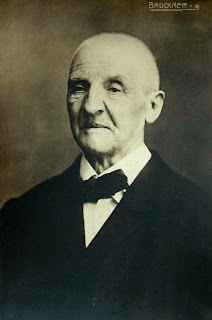Information
Composer: Anton Bruckner
- Symphony No. 5 in B flat major (1878, ed. Haas): I. Introduction. Adagio - Allegro
- Symphony No. 5 in B flat major (1878, ed. Haas): II. Adagio. Sehr langsam
- Symphony No. 5 in B flat major (1878, ed. Haas): III. Scherzo. Molto vivace - Trio
- Symphony No. 5 in B flat major (1878, ed. Haas): IV. Finale. Adagio - Allegro moderato
BBC Symphony Orchestra
Jascha Horenstein, conductor
Date: 1971
Label: BBC Legends
---------------------------------------------------------------
Review
A great reading of Bruckner’s mighty Fifth in the hands of a fine interpreter, captured on the wing at the 1971 Proms
Jascha Horenstein was 30 when he made what is perhaps the finest of the early electrical Bruckner recordings, his 1928 Berlin Philharmonic recording of the Seventh Symphony (Koch, 7/91 – nla). Later, in the 1950s, his Vienna Pro Musica recordings of the Eighth and Ninth Symphonies were regarded, along with Rosbaud’s South-West German RSO Bruckner recordings, as models of logic, probity and musical good sense.
This superb 1971 Prom performance of the Fifth Symphony exhibits all the same qualities: a continuous forward-moving pulse and great structural shrewdness. It is a dramatic reading and, in the finale, an epic one, too. The opening movement has a Beethovenian tautness about it, the finale a Bach-like grandeur and complexity. Nor is the tension allowed to slacken midway. The slow movement is briskly played, yet such is Horenstein’s sense of harmony and line that there is no descent into bathos as there is in the brisk, uninvolved treatment of the clarinet’s falling sevenths (bars 23-26) in, for example, Klemperer’s EMI recording. Similarly, Horenstein asks for fierce tempo contrasts at the start of the Scherzo, firing up the drama to ensure that what follows keeps the symphonic and volkstumlich, folksy elements finely balanced. (The Trio is especially fine.)
Most conductors wreck the finale by surging forward at fig F. Among conductors who famously avoid the trap are Karajan and Celibidache; Horenstein’s tempos in the exposition are similar to theirs. He does move forward at fig F, but with him the effect is not catastrophic. The playing has weight and power. What’s more, the whole of what is in effect a massive interlude in F minor (the initial onslaught) and F major (the chorale) is taken in a single pulse. It is typical of Horenstein that though his solutions are different from Karajan’s or Celibidache’s they are every bit as successful: if anything, even more daring.
Nor does the playing fall away in the finale as it is inclined to do in live performances, and some recordings, where a non-specialist Bruckner band is trying to do the impossible on three rehearsals. The sound is also very fine (an occasional hint of pre-echo notwithstanding) with unfussy microphone placements and more first-rate work by Horenstein, who was born into an age when conductors, not engineers, balanced orchestras. What is especially interesting is the chamber-music-like intimacy of horn (superb, solo and en masse), flute and strings in moments of meditation and transition. In passages such as this, Horenstein and his players hold the line but alter the focus.
As invariably happens in a Prom performance, the cheering begins before the final chord has finished sounding, always a nasty shock after a musical experience as pure and thrilling as this. But at least in 1971 there were no announcers jumping in with instant encomia and pre-scripted quotes as has more recently been the fashion on BBC Radio 3.
-- Richard Osborne, Gramophone
More reviews:
http://www.musicweb-international.com/classrev/2000/june00/bruckner5horenstein.htm
http://www.classical-music.com/review/bruckner-23
http://www.classicstoday.com/review/review-4295/
http://www.amazon.com/Bruckner-Symphony-No-5-A/dp/B00004SV5H
---------------------------------------------------------------

Anton Bruckner (4 September 1824 – 11 October 1896)) was an Austrian composer. His symphonies are considered emblematic of the final stage of Austro-German Romanticism because of their rich harmonic language, strongly polyphonic character, and considerable length. Bruckner composed eleven symphonies, scored for a fairly standard orchestra. His orchestration was modeled after the sound of his primary instrument, the pipe organ.
http://en.wikipedia.org/wiki/Anton_Bruckner
http://en.wikipedia.org/wiki/Anton_Bruckner
***
Jascha Horenstein (6 May [O.S. 24 April] 1898 – 2 April 1973) was an American conductor. He studied with Joseph Marx and Franz Schreker, and also worked as an assistant to Wilhelm Furtwängler. Horenstein is particularly remembered as a champion of modern music and as a Mahler conductor.
http://en.wikipedia.org/wiki/Jascha_Horenstein
http://en.wikipedia.org/wiki/Jascha_Horenstein
---------------------------------------------------------------
FLAC, tracks
Links in comment
Enjoy!



This comment has been removed by the author.
ReplyDeletePlease restore links to this rare recording. Your site is filled with gems!
ReplyDeleteChoose one link, copy and paste it to your browser's address bar, wait a few seconds (you may need to click 'Continue' first), then click 'Skip Ad' (or 'Get link').
ReplyDeleteIf you are asked to download or install anything, IGNORE, only download from file hosting site (mega.nz).
If MEGA shows 'Bandwidth Limit Exceeded' message, try to create a free account.
http://fumacrom.com/3OO21
or
https://uii.io/KONe5XJ
or
https://exe.io/GFBU